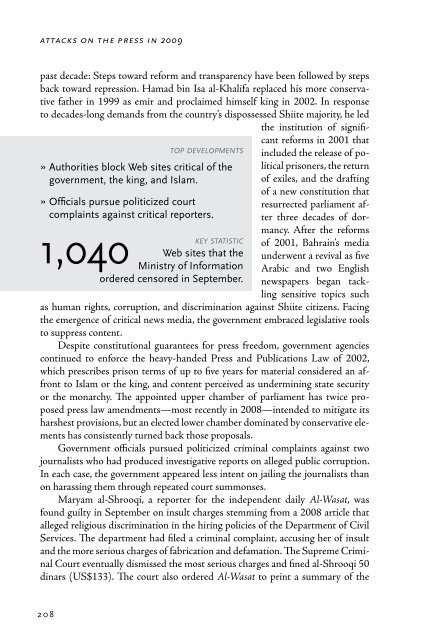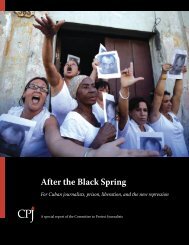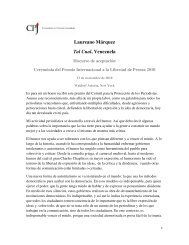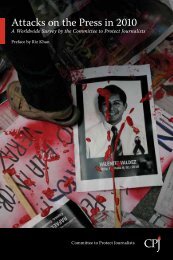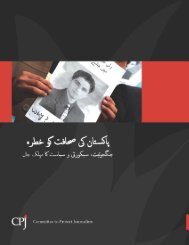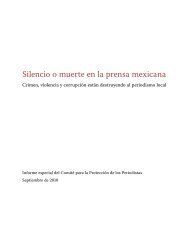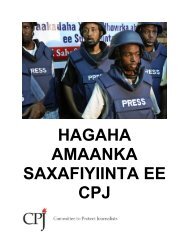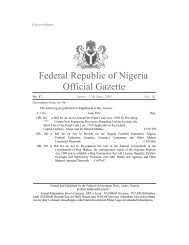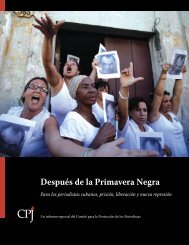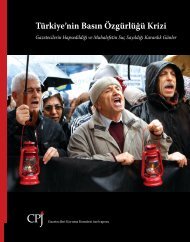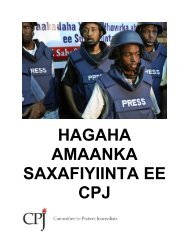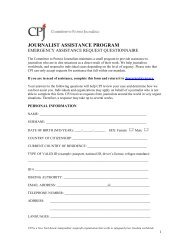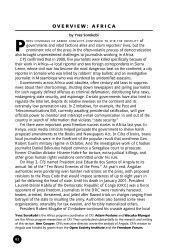Attacks on the Press - Committee to Protect Journalists
Attacks on the Press - Committee to Protect Journalists
Attacks on the Press - Committee to Protect Journalists
- No tags were found...
You also want an ePaper? Increase the reach of your titles
YUMPU automatically turns print PDFs into web optimized ePapers that Google loves.
attacks <strong>on</strong> <strong>the</strong> press in 2009middle east and north africa: egyptt o p developments»»Authorities block Web sites critical of <strong>the</strong>government, <strong>the</strong> king, and Islam.»»Officials pursue politicized courtcomplaints against critical reporters.key statistic1,040Web sites that <strong>the</strong>Ministry of Informati<strong>on</strong>ordered censored in September.past decade: Steps <strong>to</strong>ward reform and transparency have been followed by stepsback <strong>to</strong>ward repressi<strong>on</strong>. Hamad bin Isa al-Khalifa replaced his more c<strong>on</strong>servativefa<strong>the</strong>r in 1999 as emir and proclaimed himself king in 2002. In resp<strong>on</strong>se<strong>to</strong> decades-l<strong>on</strong>g demands from <strong>the</strong> country’s dispossessed Shiite majority, he led<strong>the</strong> instituti<strong>on</strong> of significantreforms in 2001 thatincluded <strong>the</strong> release of politicalpris<strong>on</strong>ers, <strong>the</strong> returnof exiles, and <strong>the</strong> draftingof a new c<strong>on</strong>stituti<strong>on</strong> thatresurrected parliament afterthree decades of dormancy.After <strong>the</strong> reformsof 2001, Bahrain’s mediaunderwent a revival as fiveArabic and two Englishnewspapers began tacklingsensitive <strong>to</strong>pics suchas human rights, corrupti<strong>on</strong>, and discriminati<strong>on</strong> against Shiite citizens. Facing<strong>the</strong> emergence of critical news media, <strong>the</strong> government embraced legislative <strong>to</strong>ols<strong>to</strong> suppress c<strong>on</strong>tent.Despite c<strong>on</strong>stituti<strong>on</strong>al guarantees for press freedom, government agenciesc<strong>on</strong>tinued <strong>to</strong> enforce <strong>the</strong> heavy-handed <strong>Press</strong> and Publicati<strong>on</strong>s Law of 2002,which prescribes pris<strong>on</strong> terms of up <strong>to</strong> five years for material c<strong>on</strong>sidered an affr<strong>on</strong>t<strong>to</strong> Islam or <strong>the</strong> king, and c<strong>on</strong>tent perceived as undermining state securityor <strong>the</strong> m<strong>on</strong>archy. The appointed upper chamber of parliament has twice proposedpress law amendments—most recently in 2008—intended <strong>to</strong> mitigate itsharshest provisi<strong>on</strong>s, but an elected lower chamber dominated by c<strong>on</strong>servative elementshas c<strong>on</strong>sistently turned back those proposals.Government officials pursued politicized criminal complaints against twojournalists who had produced investigative reports <strong>on</strong> alleged public corrupti<strong>on</strong>.In each case, <strong>the</strong> government appeared less intent <strong>on</strong> jailing <strong>the</strong> journalists than<strong>on</strong> harassing <strong>the</strong>m through repeated court summ<strong>on</strong>ses.Maryam al-Shrooqi, a reporter for <strong>the</strong> independent daily Al-Wasat, wasfound guilty in September <strong>on</strong> insult charges stemming from a 2008 article thatalleged religious discriminati<strong>on</strong> in <strong>the</strong> hiring policies of <strong>the</strong> Department of CivilServices. The department had filed a criminal complaint, accusing her of insultand <strong>the</strong> more serious charges of fabricati<strong>on</strong> and defamati<strong>on</strong>. The Supreme CriminalCourt eventually dismissed <strong>the</strong> most serious charges and fined al-Shrooqi 50dinars (US$133). The court also ordered Al-Wasat <strong>to</strong> print a summary of <strong>the</strong>verdict in <strong>the</strong> same place in <strong>the</strong> paper as <strong>the</strong> original article. An appeal was pendingin late year.Lamees Dhaif, a columnist for <strong>the</strong> privately owned daily Al-Waqt, was alsosumm<strong>on</strong>ed <strong>to</strong> court <strong>on</strong> charges of insulting <strong>the</strong> judiciary in a series, “The Dossierof Great Shame,” published in February. The pieces detailed alleged bias againstwomen in family courts, reflecting <strong>on</strong>e of <strong>the</strong> unfulfilled political reforms of 2001.The Supreme Judicial Council, <strong>the</strong> judiciary’s highest administrative body, hadlodged a criminal complaint against Dhaif after she refused a judiciary official’sdemands <strong>to</strong> write an apology and an article praising <strong>the</strong> court system. The prosecuti<strong>on</strong>was suspended in September but can be resurrected at any time.EGYPTAuthorities followed familiar tactics <strong>to</strong> c<strong>on</strong>trol news media,pursuing politicized court cases, imposing fines, using regula<strong>to</strong>ry <strong>to</strong>ols, and harassingjournalists. With Egypt seeing a burge<strong>on</strong>ing community of journalisticbloggers, authorities moved aggressively <strong>to</strong> m<strong>on</strong>i<strong>to</strong>r and c<strong>on</strong>trol <strong>on</strong>line activity.At least three <strong>on</strong>line journalists were jailed when CPJ c<strong>on</strong>ducted its annual censusof impris<strong>on</strong>ed journalists <strong>on</strong> December 1.In February, a judge in Cairo fined five journalists for violating a court orderbanning news coverage of <strong>the</strong> murder trial of Egyptian businessman HishamTalaat Mostafa, who was eventually c<strong>on</strong>victed in <strong>the</strong> killing of Lebanese singerSuzanne Tamim. News reports said that fines of 10,000 pounds (US$1,803)were levied against edi<strong>to</strong>r Magdi al-Galad and reporters Yusri al-Badri and Faruqal-Dissuqi of <strong>the</strong> independent daily Al-Masry al-Youm, al<strong>on</strong>g with edi<strong>to</strong>r Abbasal-Tarabili and reporter Ibrahim Qaraa of <strong>the</strong> oppositi<strong>on</strong> Al-Wafd. Sayyid AbuZaid, lawyer for <strong>the</strong> Egyptian <strong>Journalists</strong> Syndicate, <strong>to</strong>ld CPJ that similar chargeshad been filed, but dropped, against <strong>the</strong> state-owned dailies Al-Ahram and AkhbarAl-Youm.After highly publicized proceedings, a Cairo appellate court in Februarystruck down <strong>on</strong>e-year jail terms against four edi<strong>to</strong>rs but upheld 20,000-pound(US$3,540) fines against each of <strong>the</strong>m, according <strong>to</strong> news reports. The four edi<strong>to</strong>rshad been charged in 2007 with publishing “false informati<strong>on</strong> likely <strong>to</strong> disturbpublic order” in c<strong>on</strong>necti<strong>on</strong> with s<strong>to</strong>ries that raised questi<strong>on</strong>s about PresidentHosni Mubarak’s health at a time when he had been out of public view. The fineswere imposed against Ibrahim Eissa of <strong>the</strong> daily Al-Dus<strong>to</strong>ur, Adel Hamouda of<strong>the</strong> weekly Al-Fajr, Wael el-Abrashi of <strong>the</strong> weekly Sawt al-Umma, and AbdelHalim Kandil of <strong>the</strong> weekly Al-Karama.A principal in <strong>the</strong> Cairo News Company, which provides producti<strong>on</strong> ser-2082 0 9


